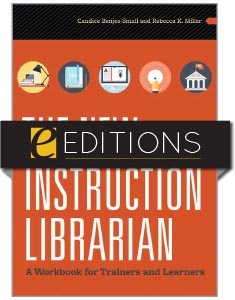
The New Instruction Librarian: A Workbook for Trainers and Learners—eEditions e-book
The download link for this product can be found on the final confirmation screen after you complete your purchase, and may also be accessed from your Account Profile. For more information about ALA eEditions file types and how to view them on eReaders, desktop computers, and other devices, see this page.
Primary tabs
You don't need to be an ALA Member to purchase from the ALA Store, but you'll be asked to create an online account/profile during checkout to proceed. This Web Account is for both Members and non-Members. Note that your ALA Member discount will be applied at the final step of the checkout process.
If you are Tax-Exempt, please verify that your account is currently set up as exempt before placing your order, as our new fulfillment center will need current documentation. Learn how to verify here.
- Description
- Table of Contents
- About the authors
- Reviews
The sheer amount of resources on the subject of information literacy is staggering. Yet a comprehensive but concise roadmap specifically for librarians who are new to instruction, or who are charged with training someone who is, has remained elusive. Until now. This book cuts through the jargon and rhetoric to ease the transition into library instruction, offering support to all those involved, including library supervisors, colleagues, and trainees. Grounded in research on teaching and learning from numerous disciplines, not just library literature, this book
- shows how to set up new instruction librarians for success, with advice on completing an environmental scan, strategies for recruiting efficiently, and a training checklist;
- walks readers step by step through training a new hire or someone new to instruction, complete with hands-on activities and examples;
- explores the different roles an instruction librarian is usually expected to play, such as educator, project manager, instructional designer, and teaching partner;
- demonstrates the importance of performance evaluation and management, including assessment and continuing education, both formal and informal; and
- provides guided reading lists for further in-depth study of a topic.
A starter kit for librarians new to instruction, this resource will be useful for training coordinators as well as for self-training.
Check out this book's Web Extra now!
Preface
Acknowledgments
Introduction
Part One
Chapter One Identifying as an Instruction Librarian
Chapter Two Laying the Groundwork
Part Two
Chapter Three The Many Hats We Wear
Chapter Four Colleague
Chapter Five Instructional Designer
Chapter Six Teacher
Chapter Seven Teaching Partner
Chapter Eight Advocate
Chapter Nine Project Manager
Chapter Ten Coordinator
Chapter Eleven Learner
Part Three
Chapter Twelve Observation
Chapter Thirteen Performance Evaluation and Management
Part Four: Tools and Templates
Needs Assessment Tool
Sample Training Curriculum
Sample Job Ad
Sample Candidate Criteria Spreadsheet
Sample Interview Schedule
Sample Orientation Checklist
Sample Orientation Schedule
Sample Training Schedule
Personal Learning Plan Template
Sample Lesson Plan 1
Sample Lesson Plan 2 and Script
Sample Assignments
Sample Observation Form
About the Authors
Index
Candice Benjes-Small
Candice Benjes-Small began her career at the University of Southern California and since 2001 has worked at Radford University in Radford, Virginia. She is the head of information literacy and outreach and university coordinator of information literacy for the general education curriculum. Under her leadership, the library instruction program has been recognized as an Exemplary Information Literacy program in numerous categories by the ACRL. She has served as president of the Virginia chapter of ACRL (VLACRL) and is active on numerous VLACRL committees. She and Rebecca K. Miller founded The Innovative Library Classroom, a very popular regional information literacy conference that won the 2016 Beta Phi Mu Conference Support Award. She has written numerous publications on information literacy and was lead author on an article about cognitive development and web evaluation which was selected as a Top 20 article by the Library Instruction Round Table. She is also an instructor for the Library Juice Academy on library instruction assessment.
Rebecca K. Miller
Rebecca K. Miller is the head of library learning services at Penn State University Libraries in State College, Pennsylvania. A 2012 ALA Emerging Leader, she earned an MAEd in instructional design and technology from Virginia Tech in 2014, an MSLS from the School of Information and Library Science at the University of North Carolina at Chapel Hill in 2007, and a BA in English and Religion from the College of William & Mary in Virginia in 2004. She is active in regional, state, and national library organizations and has authored and coauthored a number of books, technical reports, and articles on teaching, learning, and instructional technologies in libraries, including Rethinking Reference and Instruction with Tablets (2012), Tablet Computers in the Academic Library (2014), Mobile Devices: Service with Intention (2015), and ARL Spec Kit 349: “Evolution of Library Liaisons” (2015).
”The authors’ experience and expertise in this field is evident throughout the book. Like the position they are describing, their resources are varied and draw from both library and educational fields … Though written for college and university librarians, school librarians can find helpful information for increasing their effectiveness and confidence in working with students and faculty.”
— VOYA
”Many librarians find that their initial teaching experience is 'trial by fire' rather than a structured training program. With that in mind, the authors have written a solid overview of academic instruction librarianship for both supervisors and novices ... New instruction librarians, particularly recent graduates, will likely find the chapters related to roles to be helpful in understanding expectations in their new workplace. Even experienced managers should find this work to be helpful in thinking about how to welcome librarians into the instruction programs."
— Library Journal


